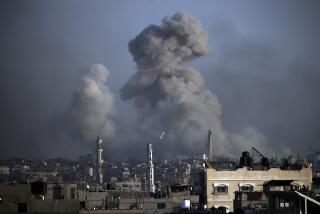Don’t Let Cambodia Slip Back Into the Abyss : Peace: A new coalition must be crafted without the Khmer Rouge, who are biding time for a return to the killing fields.
- Share via
Amid all the urgent claims on its energy and attention, Warren Christopher’s new team at the State Department must not ignore what is happening in Cambodia. The strategic and economic stakes are inconsequential, but the political and humanitarian concerns are huge and the potential for another massive international tragedy is high.
This issue has an extraordinarily complex history and an even more complicated present. But complexity is no excuse for a policy that continues to confuse the desirable with the possible.
After the Vietnam War, Cambodia came under the control of the fanatical Khmer Rouge, who in just two years turned it into a charnel house. Today, a United Nations Transitional Authority for Cambodia (UNTAC) is trying to implement an international agreement signed in Paris calling for a cease-fire and elections in which all Cambodian political factions (including the Khmer Rouge) are to participate to select a new government.
But this diplomatic edifice is built upon an illusion--that the Khmer Rouge can be laundered through an electoral process and emerge as just another political party. Many of those involved in the Paris negotiations were surely aware of the fallacy of this assumption, but there was a willing suspension of disbelief because to do otherwise would have foreclosed China’s adherence to the agreement.
U.S. policy has been to support the Paris accords, while opposing the return of the Khmer Rouge. Unfortunately, these two objectives are mutually incompatible. The current leadership of the Khmer Rouge is identical, to a man, to that which produced the killing fields. There is not a shred of evidence that they ever intended to live up to the spirit or the letter of Paris. They have obstructed, defied, threatened and assaulted UNTAC personnel at every turn.
Despite a new round of international negotiations, the Khmer Rouge have effectively refused to participate--or allow the areas under their control to participate--in any elections. They intend to wait out the settlement process, conceal most of their weapons and personnel, and then resume their bid for power when the elections are over and UNTAC has departed.
For the Khmer Rouge, the outcome of any election matters little. They neither expect nor need to win the vote count. But when the last UNTAC observer leaves, the Khmer Rouge will get down to the business of the real “election”--and this one will be conducted with guns instead of ballots and terror instead of speeches.
The United States and the United Nations must make some hard choices and make them quickly. They must decide what their real objective is, a “settlement” as an end in itself, or prevention of a Khmer Rouge return? If the latter, then they must press hard for the formation of a new political coalition including both the current regime and the non-communist Khmer--essentially everyone except the Khmer Rouge--under at least the titular leadership of Prince Norodom Sihanouk. The Phnom Penh government and the non-communists need one another. The former controls the bureaucracy and the only Khmer military force (aside from the Khmer Rouge) worthy of the name. The latter bring political legitimacy plus connections to the West and to overseas Cambodians who can offer technical, business and management skills that the current regime lacks.
And what of the Khmer Rouge? They will try to sabotage the process through every means at their disposal and will almost certainly resume full military operations against the new coalition government. But the Khmer Rouge will restart guerrilla warfare in any case; the question is whether they are allowed to control the timetable and the circumstances.
The international community, including the United States, will have an obligation--and this is vital--to provide the new coalition with the economic and technical assistance as well as military training and equipment needed to establish itself and resist the Khmer Rouge. It is doubtful that any foreign combat troops will be required. The current government, inept as it is, has pretty much fought the Khmer Rouge to a standoff. With international help and a broadened political base it should prevail. If foreign troops are required, they will be relatively few in number and under no circumstances should they be American. The five Gurkha battalions stationed in Hong Kong, for instance, could be put to better use in Cambodia.
The Cambodian conundrum can be solved and a small country brought back from the abyss. But time is short and history will be a harsh judge if we prove unequal to the moment.
More to Read
Sign up for Essential California
The most important California stories and recommendations in your inbox every morning.
You may occasionally receive promotional content from the Los Angeles Times.










